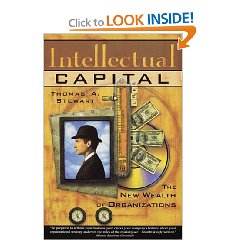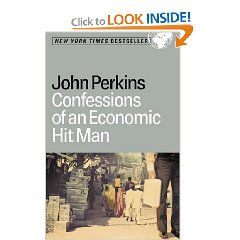Too many people will miss the core message of this book, which is about paying attention to truth and seeking out truth in the context of networks of trust, rather than about managing the process of internal knowledge.
When the author says “It's time to gather the grain and torch the chaff,” his book over-all tells me he is talking about brain-power and a culture of thinking (the grain) and counterproductive information technology and irrelevant financial audits (the chaff).
This is one of those rare books that is not easily summarized and really needs to be read in its entirely. A few items that jumped out at me:
1) Training is a priority and has both return on investment and retention of employee benefits that have been under-estimated.
2) All major organizations (he focused on business, I would certainly add government bureaucracies) have “legal underpinnings, ..systems of governance, ..management disciplines, ..accounting (that) are based on a model of the corporation that has become irrelevant.”
3) Although one reviewer objected to his comments on taxation, the author has a deeper point–the government is failing to steer the knowledge economy because it is still taxing as if we had an industrial economy–this has very severe negative effects.
4) As I read the author's discussion of four trends he credits to John Hagel of I2, it was clear that “intelligence” needs to be applied not only to single organizations, but to entire industries. In my view, this author is quite brilliant and needs to be carefully cultivated by the U.S. Chamber of Commerce, all of the industry associations, and by governments. There are some extremely powerful “macro” opportunities here that his ideas could make very profitable for a group acting in the aggregate.
5) This is one book that should have had footnotes instead of end-notes, for while the author is careful to credit all ideas borrowed from others, it is difficult in the text to follow his thinking in isolation. One idea that is very pertinent to national intelligence and counterintelligence as well as corporate knowledge management is that of the reversal of the value chain–“first sell, then make,” i.e. stop pushing pre-conceived products out the door and get into the business of just enough, just in time knowledge or product creation that is precisely tailored to the real time needs of the client.
6) The author excells at blasting those corporations (and implicitly, major government bureaucracies such as the spy agencies that spend over $30 billion a year of taxpayer funds) that assume that if they only apply more dollars to the problem, they can solve any challenge. “Too often ‘dumb power' produces a higher-level stalemate.” One could add: and at greater cost!
7) The bottom line of this truly inspired and original book comes in the concluding chapters when the author very ably discusses how it is not knowledge per se that creates the value, but rather the leadership, the culture, and infrastructure (one infers a networked infrastructure, not a hard-wired bunker). These are the essential ingredients for fostering both knowledge creation and knowledge sharing, something neither the CIA nor the FBI understood at the management level in the years prior to 9-11.
Final note: I missed the pre-cursor to this book, Intellectual Capital: The New Wealth of Organizations (1997) and just read it. I recommend both books, and in some ways, it is better to read this book first. I also recommend Robert Buckman's Building a Knowledge-Driven Organization, and the book, The Innovator's Solution: Creating and Sustaining Successful Growth as ideal companions to this path-finding work.
Recently published (2006 and on), see also, with reviews:
The Wealth of Networks: How Social Production Transforms Markets and Freedom
The Fortune at the Bottom of the Pyramid: Eradicating Poverty Through Profits (Wharton School Publishing Paperbacks)











